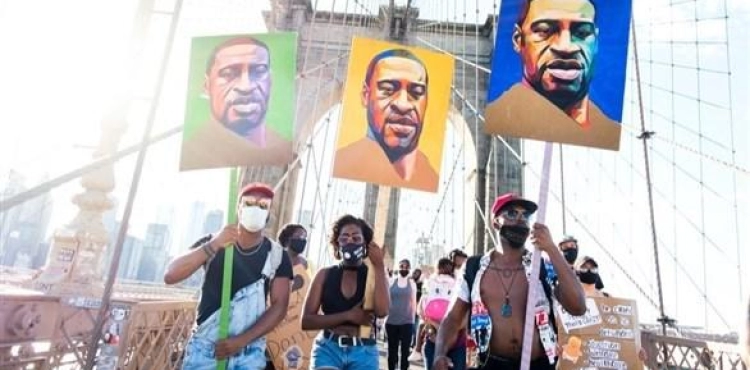The United States commemorates Friday the end of slavery in the midst of unrest, sparked by unjustified police violence and the racism and discrimination behind it still present towards black Americans.
Thousands of people are expected to participate in several demonstrations that extend from New York to Los Angeles to mark the 155th anniversary of the so-called "Jonathan" (the June and 19-year incorporation in English), the day during which "slaves" in Galveston, Texas realized that they were free.
On Friday morning, local time, several streets in downtown Washington, DC, were closed to traffic in the midst of a widespread police presence in the vicinity of the White House and the newly-named square "Black Life Matters" as protesters are expected to meet during the day, according to journalists in France Press.
However, several tragedies occurred during the current year, which pushed the country towards the initiation of a rethinking of the issue of racism, which marked its past and is still present in society.
The most notable of these events was the death of the 46-year-old black American George Floyd suffocation at the end of May in Minneapolis, after white policeman Dirk Schofin kneeled over his neck for more than eight minutes amid his repeated pleas for the phrase "I can´t breathe."
The publication of the entire scene in a video clip recorded by passers-by, shocked the country and massive demonstrations, sometimes interspersed with violence and looting, rejecting the racism present in daily life and protesting police violence.
"The painful fact is that what happened is not a separate incident," George Floyd´s brother, Fillonone, told a session of the Human Rights Council in Geneva. He explained that "the way my brother was tortured and his murder documented by the camera reflects how the police treat blacks in the (United States)."
Amid the shouting of the slogan "black lives matter", millions demonstrated on the streets to denounce inequality. The move highlighted the law enforcement forces´ attitudes towards the country´s minorities and their unfair behavior.
Anger was fueled by an incident in Atlanta on June 12, when a white policeman shot two on the back of a black American, Richard Brooks, who was carrying a machine that stunned his hand and tried to escape from the police.
As in Minneapolis, the policeman was fired and charged with murder.
And although Donald Trump condemned the killing of Floyd and Brooks, he missed the opportunity to appear as a collector. Instead, he criticized the protesters in phrases that were viewed as carrying racist overtones.
The Republican billionaire poured oil over the fire by inviting him to a large electoral rally in Tulsa, Oklahoma, coinciding with the anniversary of the end of slavery. And the memory of this city is still printed with the memory of one of the worst racist riots, as it witnessed in 1921 the killing of up to 300 African Americans by a white crowd.
Trump´s option was described as provocative, forcing him to delay the rally for a day. The city announced a curfew from Thursday evening to Saturday morning, then during Saturday night to Sunday in the ocean where the president will deliver his speech, for fear of abuse.
The president issued a message of sympathy for black Americans Friday, condemning the "unimaginable injustice of slavery."
The demonstrations and protests that took place during the past weeks have led Americans to rethink the history of their country torn apart by the issue of slavery, a system that provided economic prosperity.
Calls for the removal of a monument honoring generals and Confederate officials in the time of the Civil War (1861-1865), which are widespread in the south of the country, and some have been removed.
NASCAR racing banned the raising of Confederate flags in the arenas, as crowds often raise them in the south, where these races are famous. On Thursday, Democratic leader in Nancy Pelosi ordered the removal of pictures of four former House presidents because they had sided with supporters of the Confederacy.
Big companies like Nike and Twitter have given their employees a memorial holiday.
Despite the gains recorded in the 1950s and 1960s by the civil rights movement, blacks, who make up about 13% of the population, are still marginalized. This minority suffers from high levels of poverty and is not represented fairly at the political level.
The crisis of the Covid 19 epidemic has compounded this reality, as unemployment among blacks has increased dramatically amid the paralysis in the American economy. With blacks generally working in basic but low-wage jobs, they were more likely to be infected with the virus.












